As writer Annie Dillard said, “How we spend our days is, of course, how we spend our lives.” However, whether or not we can customize them entirely how we want is up for debate.
The average person will spend90,000 hoursat work over a lifetime. But according to TikTok user ‘Debate Her,’ this goes against our design.
In one of her recent videos, the self-proclaimed reformist explained how she thinks we got to this huge number and why it’s bigger than it should be.
More info:TikTok|YouTube
If you’re feeling burned out and tired all the time, it might not be ayouproblem

Image credits:Nataliya Vaitkevich (not the actual photo)
Afer a TikTok user addressed the 40-hour workweek

Image credits:debateher
“No, but seriously, it’s 2023 and humans are working more today than they ever have in history. So how did we get here? Great question. I would love to tell you because no, you’re not lazy, you’re overworked and we were never meant to live this way.
For 95% of human history up until about the 1600s, humans worked on average 4-6 hours a day for maybe 42% – 50% of the days of the year.”

“Work was done leisurely and self-paced and long breaks for food, naps, and avoiding the hottest hours of the day was expected and the norm. These patterns are so prevalent across cultures, it’s believed that this is the natural working rhythm that humans prefer.
Gone were the days of showing up to work when you were ready, instead you’re expected to be there at a set time.”

Image credits:cottonbro studio (not the actual photo)
“Now, at first, workers didn’t comply to this so the capitalists worked hand in hand with the government to make being late to work a punishable crime. So after that forced compliance was upheld, the boundaries were pushed a little further.
Standardized and significantly reduced break times, less and less holidays and instead of having a few weeks off multiple times a year, most employees now maybe got a vacation right around Christmas.
The traditional public school model that we were all raised in was literally designed to create obedient workers who wouldn’t question how much freedom they have. It only took a few generations for humans to go from working as needed to working long hours with short breaks most of the year.”

Image credits:Tima Miroshnichenko (not the actual photo)
“No time for rest, for hobbies, for your family, nothing. Profit margins and GDP skyrocketed but workers were making less than ever before.
This trend of a few capitalists at the top working hand in hand with the government to slowly milk as much labor out of the population as possible, while cutting costs as much as possible, just compounded year after year.
Meanwhile, corporate consolidation ensured that fewer and fewer people actually reaped the benefits of capitalism. Leading us to where we are today.
The clip has been viewed over 2 million times
The roots of these arguments can be found in sociologist Juliet Schor’s bookThe Overworked American
Content creator ‘Debate Her’ is continuing the thoughts of Juliet Schor, a Professor of Sociology at Boston College, who explained in her 1991 bookThe Overworked American: The Unexpected Decline of Leisure, that the average American in 1987 was working about 1,949 hours annually, while an adult male peasant in 13th-century England racked up approximately 1,620 hours yearly.

Image credits:Jonny Gios (not the actual photo)
However, Schor argues that these images are backward projections of modern work patterns and that they are false.
“Before capitalism, most people did not work very long hours at all. The tempo of life was slow, even leisurely; the pace of work relaxed. Our ancestors may not have been rich, but they had an abundance of leisure. When capitalism raised their incomes, it also took away their time. Indeed, there is good reason to believe that working hours in the mid-nineteenth century constituted the most prodigious work effort in the entire history of humankind.”
However, some people oppose this view
Tim Worstall, who is a Senior Fellow at a think tank called the Adam Smith Institute, rejects this thinking.
“What Shor (and others, for there are others who make the same claim) has done is looked at the labor service expected of the villein and then claimed that this was the amount of work they had to do,” hesaid. “Nonsense: this work on the lord’s demesne was the rent payable for the peasant’s own land to farm. Something which rather added to his workload, of course, that of farming his own land.”

Image credits:jesse orrico (not the actual photo)
“We might also point to the amount of household labor that had to be performed. Yarn had to be spun, cloth to be weaved,” Worstall continued. “Cooking was over open fires: and that firewood had to be collected. Bread baked and so on and on.”
“There was a recent report (rather exaggerated but still) which claimed that in the 1930s it took 65 hours of human labor a week to run a household. Today it takes 3. Things were [even] worse back in medieval days.”
And finally, according to Worstall, there’s the fact that these villeins and churls were animal-owning peasant farmers. “People who own animals just don’t get 70 days off a year, you don’t manage to go off … for a week and then expect to have live animals when you come back,” he said.
The researcher argues that Schor and others mistake work in the market economy for all the work being done. “They’ve decided not to include that back-breaking labor done inside the household as labor.”
Either way, the TikTok clip has ignited a heated discussion on the modern workday

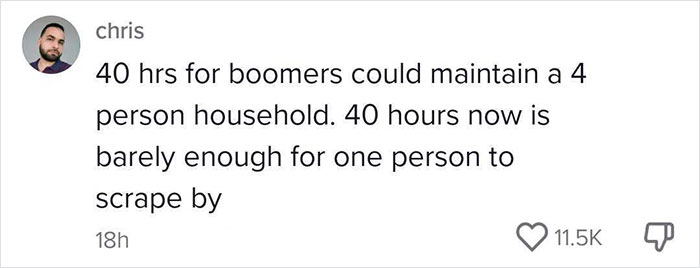



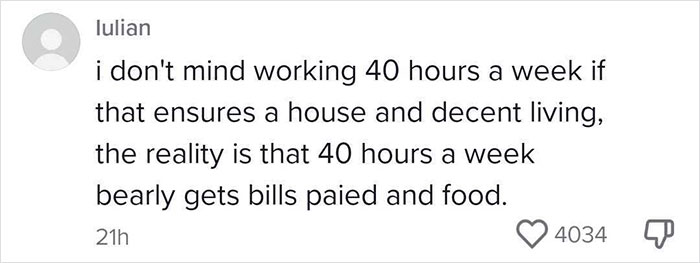
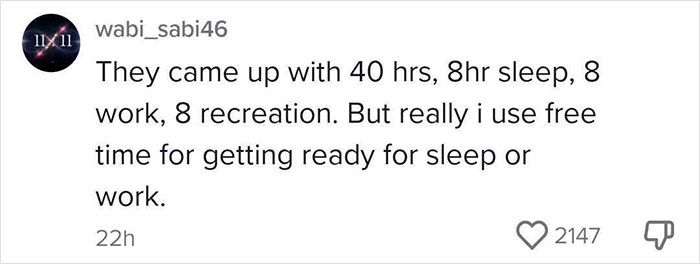
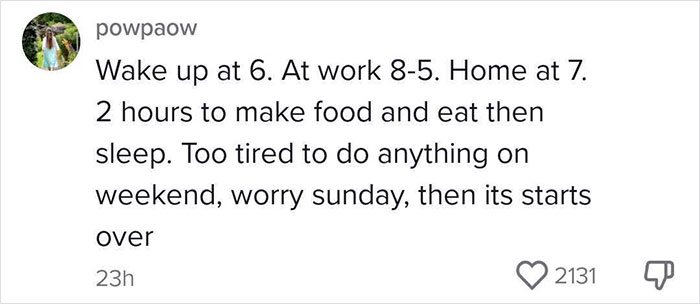




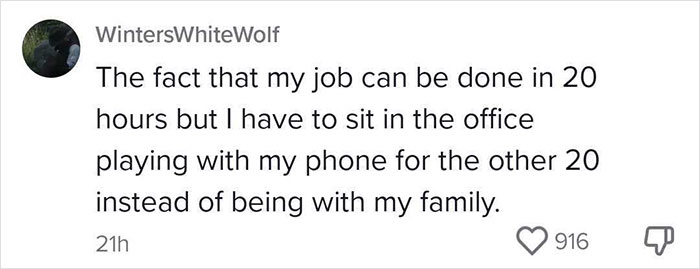
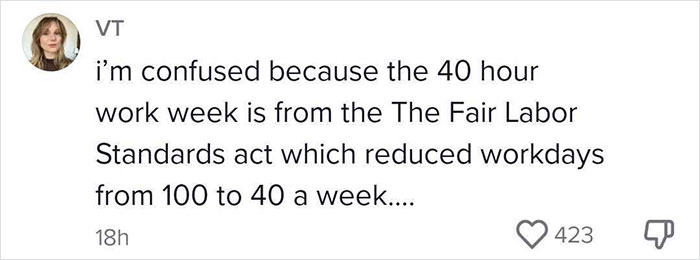



 You May Like45 Insane Workplace Moments That Got Legendary StatusJustinas KeturkaGuy Works 50+ Hours/Week Only For His Successor To Automate Everything And Have Nothing To DoIndrė Lukošiūtė“Not Having On A Bra”: 30 Super Unprofessional Things People Have Seen At WorkJustinas Keturka
You May Like45 Insane Workplace Moments That Got Legendary StatusJustinas KeturkaGuy Works 50+ Hours/Week Only For His Successor To Automate Everything And Have Nothing To DoIndrė Lukošiūtė“Not Having On A Bra”: 30 Super Unprofessional Things People Have Seen At WorkJustinas Keturka
Justinas Keturka
Indrė Lukošiūtė
Work & Money